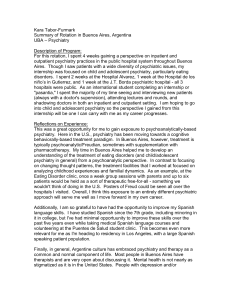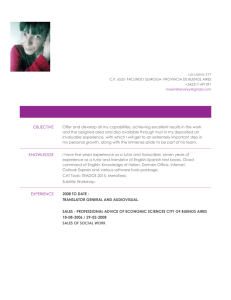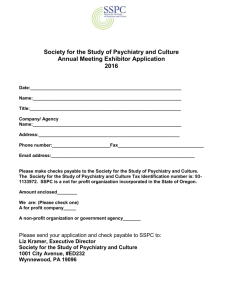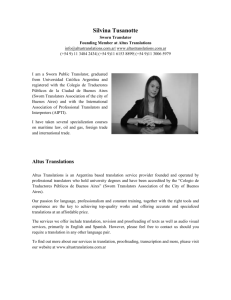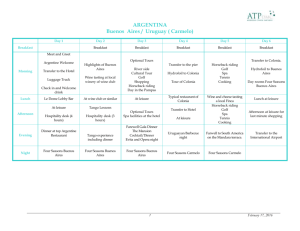Sasha Waring - Universidad de Buenos Aires
advertisement
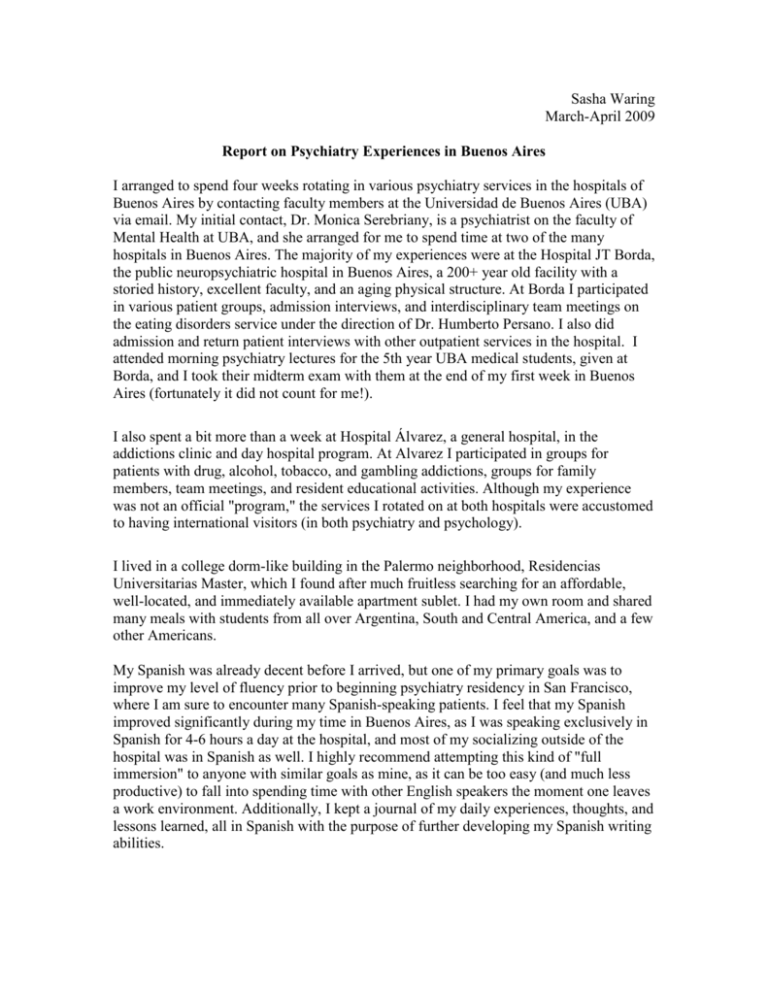
Sasha Waring March-April 2009 Report on Psychiatry Experiences in Buenos Aires I arranged to spend four weeks rotating in various psychiatry services in the hospitals of Buenos Aires by contacting faculty members at the Universidad de Buenos Aires (UBA) via email. My initial contact, Dr. Monica Serebriany, is a psychiatrist on the faculty of Mental Health at UBA, and she arranged for me to spend time at two of the many hospitals in Buenos Aires. The majority of my experiences were at the Hospital JT Borda, the public neuropsychiatric hospital in Buenos Aires, a 200+ year old facility with a storied history, excellent faculty, and an aging physical structure. At Borda I participated in various patient groups, admission interviews, and interdisciplinary team meetings on the eating disorders service under the direction of Dr. Humberto Persano. I also did admission and return patient interviews with other outpatient services in the hospital. I attended morning psychiatry lectures for the 5th year UBA medical students, given at Borda, and I took their midterm exam with them at the end of my first week in Buenos Aires (fortunately it did not count for me!). I also spent a bit more than a week at Hospital Álvarez, a general hospital, in the addictions clinic and day hospital program. At Alvarez I participated in groups for patients with drug, alcohol, tobacco, and gambling addictions, groups for family members, team meetings, and resident educational activities. Although my experience was not an official "program," the services I rotated on at both hospitals were accustomed to having international visitors (in both psychiatry and psychology). I lived in a college dorm-like building in the Palermo neighborhood, Residencias Universitarias Master, which I found after much fruitless searching for an affordable, well-located, and immediately available apartment sublet. I had my own room and shared many meals with students from all over Argentina, South and Central America, and a few other Americans. My Spanish was already decent before I arrived, but one of my primary goals was to improve my level of fluency prior to beginning psychiatry residency in San Francisco, where I am sure to encounter many Spanish-speaking patients. I feel that my Spanish improved significantly during my time in Buenos Aires, as I was speaking exclusively in Spanish for 4-6 hours a day at the hospital, and most of my socializing outside of the hospital was in Spanish as well. I highly recommend attempting this kind of "full immersion" to anyone with similar goals as mine, as it can be too easy (and much less productive) to fall into spending time with other English speakers the moment one leaves a work environment. Additionally, I kept a journal of my daily experiences, thoughts, and lessons learned, all in Spanish with the purpose of further developing my Spanish writing abilities. I learned a lot about psychiatry as well, both in general and in regard to its practice in Argentina. Psychoanalysis is extremely popular in Buenos Aires, an emphasis that differs from my experiences at Penn. I tried to read whatever I could in addition what I picked up from discussions with the psychiatrists and psychologists on the hospital services and from the medical student and resident lectures. I hope to continue a broad-based education in psychodynamics, cognitive therapy, and psychopharmacology during my residency, and this experience was a useful first step of that education. The practice of psychiatry in Buenos Aires, in my experience, emphasizes an interdisciplinary approach in which psychiatrists work closely with psychologists, sociologists, nurses, nutritionists, and other professionals as the needs of their patients dictate. There seems to be less hierarchy between the various staff than I have observed in Philadelphia hospitals. I think these strategies work well, and I would like to see them adopted to a greater extent in American psychiatry. I also tried to give something back to all of my hosts, which often took the form of sharing my own experiences in psychiatry in the US. Our conversations frequently shifted to discussions of comparative health care policy and world politics, and I feel that I developed a clearer sense of my own views by having these discussions with many Argentines, several Italian psychologists, and other students from all over Latin America. I had a wonderful experience in Buenos Aires. My hosts, both the official and unofficial ones, were extremely gracious and welcoming, and I always felt a part of whatever team or service I was on, even if I was only there for a day or two. Doctors and patients alike seemed comfortable with my presence, and were eager to share their experiences and knowledge with a foreign visitor. I had many fascinating conversations about psychiatry, psychodynamics, Argentine politics and history, soccer (football), health care and economic policy, food… I was able to strike a balance between spending time every day in one or more of the various psychiatry services but also having time to explore the many fascinating neighborhoods and opportunities in Buenos Aires. The weather was warm, hot at times (remember that the seasons are reversed here, so March-April is a great time to go to escape the end of Philadelphia winter). I had some initial difficulty finding a place to live, and in retrospect probably should have arranged housing before I arrived but I waited until I arrived in order to get a feel for the neighborhoods. I also had a bit of difficulty with the pace, accent, and vocabulary of porteño (Buenos Aires) Spanish, though this definitely became easier during my time here and was a challenge I both expected and sought. I believe Buenos Aires was the ideal place to achieve my various goals for this rotation, namely improving my Spanish, learning more about psychiatry, exploring a new city, and not breaking the bank. Psychiatry in Buenos Aires seemed to me to be both well-developed and relatively highly regarded both within the medical community and among the general population. I had many interesting conversations about psychiatry with people I met completely outside of the hospital. I also learned how to properly make, drink, and share the omnipresent maté, how to navigate the useful but extremely large network of city buses, how to talk about psychiatry and soccer with proper vocabulary, and how to find a good steak.


